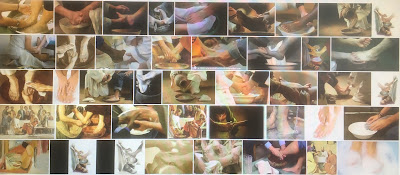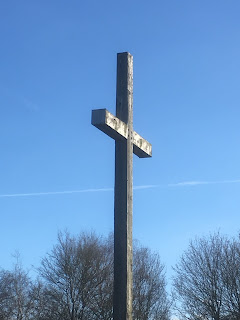This evening I was preaching and presiding at the Maundy Thursday service at the Cathedral: commemorating the Last Supper, washing feet and the Watch. It is always profoundly moving - the gathering and remembering; the water, bread and wine; the stripping of altars; music and silence; watching and waiting.
Washing your feet is hard.
It’s hard when you’ve put on a few pounds, broken a bone or strained your back; we wheeze and strain.
It’s hard as a fidgety toddler; it’s awkward on a beach or in a communal changing room.
It’s hard as we get older; becoming by degrees a little less mobile, a little more dependent on others.
It wasn’t always like this: how we take for granted the freedom of movement and flexibility; agility and balance; the sheer everyday mundane act of washing our feet.
As the poet John Ciardi puts it: In lither times the act was unstrained and pleasurable.
Washing feet is harder than it was.
We wonder at an infant’s tiny toes; we paint nails with varnish or protect them with steep capped boots. We flex them on a sandy beach, wince at our bunions and admire a dancer’s grace and poise on point.
But for someone else to wash our feet?
For us to wash the feet of another?
The etiquette of washing of feet isn’t limited to dusty streets and hot climates; it isn’t a relic of middle eastern custom. In the practical tenderness of caring and the pragmatic dignity of nursing it remains part of our social tapestry. In hospices and homes, unseen or acknowledged, we wash; from cradle to grave, we are washed.
Yet it discomforts us: the intimacy and vulnerability; the awkwardness and potential embarrassment; consent, courtesy and compassion.
Touch demands ritual. It’s an act of humanity which reveals God’s likeness - in us, through us, by us. Washing feet is hard: it’s an act of reverence. Here there is grace, humility and love outpoured.
Ciardi’s poetic meditation continues:
Mary Magdalene made a prayer meeting of it.
She, of course, was washing not her feet but God’s.
Degas painted ladies washing their own feet.
Somehow they also seem to be washing God’s feet.
Mary did indeed wash Jesus’ feet; she anointed the feet of the one who is God with us.
And when we wash our feet - the feet of others - we too honour God’s image in us.
Tonight we recall that the feet of God’s people are washed by God’s own Son.
We do more than recall it, we re-enact it.
He got up. He removed his outer robe. He tied a towel around his waist.
Water is poured. Feet are washed and wiped.
Washing feet is hard: not just uncomfortable or a bit ridiculous, but hard. The vanity of our self-assertion, pride and status are stripped away.
Are you going to?
You do not know now. You will understand.
You will never.
Unless I wash you…
Then not my feet only!
Do you know what I have done for you?
We know that we have been set an example: this mandate to wash is hard. Yet we ought and should love as Jesus loved us. He makes this commandment new by embodying it himself. In him the self-giving love of the Father is made visible. In the power of the Spirit, we become channels of grace and love divine. Our life together is to reflect the character of God.
Our remembering embodies a way of humility not humiliation. The Corinthians forgot that - preferring their distinctions of wealth, power and status. Paul calls them to remember how the many become one. Jesus was handed over and lifted up to reconcile the world to God. As we ‘do this’ we proclaim the Lord’s death until he comes; we, his body, are handed over to Spirit, receiving a foretaste of that Kingdom.
Remember.
Wash.
Love.
In this memorial and meditation we see costly service which touches our vulnerability. The one who formed us out of dust, washes dust feet. Our dignity is restored as the one who is God with us transforms our pride, shame, ambition and self-reliance.
If we love one another, with joyful self-giving, everyone will know that we are his disciples.
This memorial and meditation is more than an invitation to random acts of kindness or even intentional acts of service. It is an expression of who we are to be as God’s people; we are to live out a pattern of love which abides in and flows from the breadth and depth, intimacy and power of God’s love for us.
If we know these things, we will be blessed in doing them; we will become a blessing.
For us, as for the people of Israel, this shall be a day of remembrance and observance. As the household of God, we eat and celebrate; but now shadows lengthen and darkness falls.
On this evening, before the Passover, Jesus’ hour has come; our deliverance has come near. In this season of remembering the liberation of God’s people, God’s Son will be bound.
Do we know what Jesus has done?
In this memorial and meditation: we enter into the drama of reconciling love.
In a little while, Jesus will get up from the table again.
In a little while, he will be betrayed and handed over.
In a little while his outer robe will be removed; a crown of thorns twisted onto his head.
Ubi caritas et amor: here is love; deus ibi est: here is God.
© Julie Gittoes 2017
The texts were: Exodus 12:1-4, 11-14; 1 Corinthians 11:23-6; John 13:1-17, 31b-35





